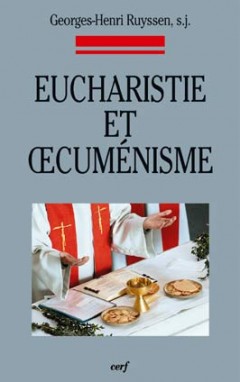Eucharistie et œcuménisme
de
Georges-Henri Ruyssen
Collection Droit canonique
832 pages - mai 2008
57,20€
L'unité des chrétiens est un impératif : Jésus. avant d'être arrêté puis crucifié, prie Dieu son Père : « Je ne prie pas seulement pour eux [ses disciples], je prie aussi pour ceux qui, grâce à leur parole, croiront en moi ; que tous soient un comme toi, Père, tu es en moi et que je suis en toi, qu'ils soient en nous eux aussi, afin que le monde croie que tu m'as envoy頻 (évangile selon saint Jean, 17, 20-21, TOB ). L'unité entre chrétiens est encore loin d'être réalisée, malgré de grands pas en avant en moins d'un siècle : Églises et Communautés ecclésiales s'ouvrent à la tâche œcuménique. Déjà en vertu de l'engagement officiel de l'Église catholique romaine, tant de l'Église latine que des Églises orientales en communion avec Rome, le droit canonique a pu traduire dans ses codes de 1983 et de 1990 les apports doctrinaux en faveur de l'œcuménisme, issus du Concile Vatican II (1962-1965) : ce dernier a eu la vocation de discerner notamment que les conditions étaient réunies pour concrétiser un œcuménisme de la part de l'Église catholique romaine et de ses baptisés, afin d'œuvrer davantage à l'unité des chrétiens. Ouverture fraternelle et vérité doctrinale ont à enrichir toute démarche œcuménique sous la responsabilité de chaque « Église chrétienne » et de chaque « Communauté ecclésiale » : qu'existent ainsi deux expressions techniques pour désigner les Églises, cela avertit que chacune n'admet pas encore l'agencement des critères d'ecclésialité préconisés par les autres Églises. Selon seulement le degré de communion entre Églises et selon les dispositions requises pour les baptisés concernés, une certaine hospitalité aux sacrements est devenue possible. Des critères catholiques romains existent à propos des sacrements de Réconciliation, de l'Eucharistie et de l'Onction des malades. L'accueil eucharistique est admis en principe dans des circonstances et des dispositions spirituelles, pastorales, théologiques et canoniques que le canoniste Georges-Henri Ruyssen analyse de manière systématique. Il compare des normes canoniques et disciplinaires postconciliaires, tant universelles que particulières (Afrique du Sud, Allemagne, Australie, Canada, États-Unis. France, Suisse), en matière de « communicatio in sacris » axée ici sur l'Eucharistie.
--
The unity of Christians is a necessity: Jesus, before his arrest and crucifixion, prays to God his Father: ‘I do not pray only for them [the disciples], I also pray for those who, thanks to their witness, will believe in me; may they all be one, as you, Father, are in me and I am in you, that they also may be one in us, so that the world may believe you sent me’ (St John, 17, 20-21). Unity among Christians is far from being accomplished, in spite of great progress made in less than a century: Churches and ecclesial Communities are now embracing the ecumenical cause. In accordance with the official engagement of the Roman Catholic Church (the Churches of the Orient in communion with Rome as much as the Latin Church), canonical law has transposed, in its codes of 1983 and 1990, the doctrinal contributions in favour of ecumenism, the fruit of the Vatican II Council (1962-1965). The vocation of the council was, among other things, to discern that the conditions were appropriate to concretize ecumenism, on the part of the Roman Catholic Church and its members working in favour of Christian unity. Fraternal opening and doctrinal truth must enrich all ecumenical initiatives under the responsibility of each ‘Christian Church’ and each ‘ecclesial community’: but the fact that two terms are required to designate the Churches is a warning that everyone does not yet accept the organization of ecclesial criteria adopted by other Churches. According to the degree of communion between Churches and the dispositions required for the baptized, a certain hospitality to the sacraments has become possible. There exists Roman Catholic criteria in reference to the sacraments of Reconciliation, the Eucharist and the Anointing of the sick. The reception of the Eucharist is, in principle, admitted in the spiritual, pastoral, theological and canonical circumstances and dispositions which the canonist Georges-Henri Ruyssen analyses in a systematic manner. He compares the canonical and post-council disciplinary standards, both universal and specific (South Africa, Germany, Australia, Canada, United States, France, Switzerland), in reference to ‘communicatio in sacris’, here based on the Eucharist.
- Dimensions : 135x215x40
- ISBN : 9782204085540
- Poids : 1000 grammes
